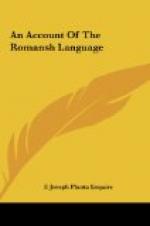As a comparison between this language and the Romansh of the Grisons cannot be considered as a mere object of curiosity, but may also serve to corroborate the proofs I have above alleged of the antiquity of the latter, I have annexed in the appendix,[AQ] a translation of this oath into the language of Engadine, which approaches nearest to it; although I must observe, that there are in the other dialect some words which have a still greater affinity with the language of the oath, as appears by another translation I have procured, in which both dialects are indifferently used. To prevent any doubts concerning the veracity of these translations, I must here declare, that I am indebted for them, and for several anecdotes concerning that language, to a man of letters, who is a native and has long been an inhabitant of the Grisons, and is lately come to reside in London. I have added to this comparative view of those two languages, the Latin words from which both seem to have been derived; and, as a proof of the existence of the Gallic Romance in France down to the twelfth century, I have also subjoined the words used in that kingdom at that period, as they are given us by the author of the article (Langue) Romane, in the French Encyclopedie.
To the comparison of the two Romances, and the similarity of their origin, I may now with confidence add the authority of Fontanini[AR] to prove, that they are one and the same language. This author, speaking of the ancient Gallic Romance, asserts that it is now spoken in the country of the Grisons; though, not attending to the variety of dialects, some of which have certainly nothing of the Italian, he supposes it to have been altogether adulterated by a mixture of that modern tongue.
Whilst the Grisons neglected to improve their language, and rejected, or indeed were out of the reach of every refinement it might have derived from polished strangers, the taste and fertile genius of the Troubadours, fostered by the countenance and elegance of the brilliant courts and splendid nobility of Provence, did not long leave theirs in the rough state in which we find it in the ninth century. But the change having been gradual and almost imperceptible, the French historians have fixed no epocha for the transition of the Romance into the Provencal. That the former language had not received any considerable alteration in the twelfth Century may be gathered from the comparison in the appendix: and, that it still bore the same name, appears from the titles of several books which are said to have been written in, or translated into, the Romance. But though mention is made of that name even after this aera, yet upon examining impartially what is given us for that language in this period, it will be found so different from the Romance of the ninth century, that to trace it any further would be both a vain and an extravagant pursuit.




